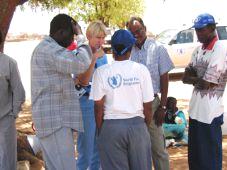Darfur: Aid workers under threat
Sudanese Authorities, Rebel Movements Must Not Impede Relief Efforts
NEW YORK, Apr 5, 2005 (HRW) — The Sudanese government has sought to intimidate humanitarian relief agencies in Darfur by arbitrarily arresting or detaining at least 20 aid workers since December, Human Rights Watch said today. In several incidents, the rebel movements in Darfur have also detained or attacked aid workers.

|
|
USAID Disaster Assistance Response Team Leader Kate Farnsworth and USAID Agricultural Specialist Abdel Rahman discuss food distribution in Darfur with representatives of the U.N. World Food Program. (USAID). |
Human Rights Watch called on all parties to the conflict in Darfur to ensure the safety of humanitarian aid workers and facilitate their access to Sudanese civilians in need of assistance.
“The Sudanese authorities are using the same strong-arm tactics against Darfur aid workers that they have used against human rights defenders,” said Peter Takirambudde, Africa director at Human Rights Watch. “Donor governments should condemn Khartoum’s attempts to intimidate aid workers and others assisting civilians in Sudan.”
Human Rights Watch has documented the arbitrary arrest and detention of more than 20 foreign and local aid workers from at least seven non-governmental organizations over the past four months. All of the incidents occurred in Nyala, the capital of South Darfur, at the hands of Sudanese security officials and representatives of military intelligence. In several cases, the aid workers were detained in police stations or other government premises for hours or even days.
Few of the humanitarian organizations involved have publicized the arrests and detentions due to fear of further reprisals by the Sudanese government against their staff, activities and the displaced persons they assist.
“The government’s arrests and threatened charges are a grossly disproportionate reaction to the so-called offenses,” Takirambudde said. “These incidents represent nothing less than a campaign to harass and threaten aid agencies to keep them in line.”
Most of the alleged offenses leading to the arrests and detentions of the aid workers appear to be minor infractions of bureaucratic procedures and hardly serious enough to warrant criminal charges. Alleged offenses include lacking the correct authorization for transport of commodities and violating a curfew. Aid workers have also been arrested and detained for what the government perceives as “suspect activities,” including possessing published reports on the human rights situation in Darfur as well as photographs and footage of displaced persons interviewed in the camps.
Although few formal legal charges have been lodged in any of the cases, Sudanese officials have threatened relief workers with violating Articles 51, 52, 53 and 58 of the 1991 Sudan Penal Code, which include the offenses of espionage and “waging war against the state.” These crimes may be punishable by death or life imprisonment. International human rights law requires that arrests be as provided by law and must not be clearly disproportionate, unjust or unpredictable.
In the Sudanese media, government officials have increasingly accused international aid organizations of various offenses including “fraudulent activities,” smuggling weapons and exaggerating allegations of rape by Sudanese forces and government-backed militias.
In December, Sudanese officials in Nyala obtained “confessions” of several foreign aid workers who were detained and threatened with indefinite detention and criminal charges, including capital offenses, if they did not apologize on film. In a program broadcast on Sudanese state television on March 22, excerpts of this footage were manipulated and used out of context as part of a program that accused aid workers of fabricating the testimonies of displaced people in the Darfur camps.
Moreover, aid workers have come under attack while traveling along the main roads in Darfur over the past six months, including in attacks by the rebel movements. An increasing number of incidents of shooting and robbery of humanitarian and commercial vehicles have taken place, particularly along the Kass-Nyala and Nyala-El Fashir roads, although responsibility for many of the incidents remains unclear.
“The Sudanese government and the rebel movements must abide by their obligation to protect and facilitate aid workers under international humanitarian law,” Takirambudde said.
The two rebel movements active in South Darfur-the Sudan Liberation Army (SLA) and the Justice and Equality Movement (JEM)-have acknowledged responsibility for several incidents in which they detained and later released aid workers in North and West Darfur. A splinter group of the JEM, the National Movement for Reform and Democracy (NMRD), has also been responsible for several incidents in which they detained and later released aid workers in West Darfur.
